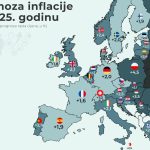ZAGREB, February 1, 2018 – All three members of the Bosnia and Herzegovina Presidency have met with the president of the European People’s Party (EPP) Joseph Daul, in Brussels and the talks focused on changing the country’s election law, however, based on statements made after the meeting, no progress has been made.
The Croat, Bosniak and Serb members of the Presidency, Dragan Čović, Bakir Izetbegović and Mladen Ivanić respectively, met with Daul on Wednesday evening for a working dinner and on Thursday morning separately and once again together for a working lunch. All three are from parties that belong to the EPP.
“We spoke for several hours with President Daul about the circumstances in Bosnia and Herzegovina, with particular emphasis on the election law. We agreed that, as far as statements are concerned, all three of us should summarise similarly that we will continue to talk to find a solution as soon as possible,” Čović said. “I trust that we will meet in Sarajevo in February together with international community institutions so that we finally agree a solution to the election law. That is approximately our joint stance,” he added.
Changes to the election legislation are a burning issue because, if they are not adopted, they could bring the implementation of election and its results into question. The elections should be held in October this year.
Bosnia and Herzegovina’s lower house of parliament on Wednesday rejected the proposed amendments to the election law put forward by the Croat HDZ BiH party, as well as a proposal by the predominantly Bosniak SDA party, returning the election reform process to square one.
The HDZ BiH’s proposal, under which Croat deputies to the upper house of parliament of the Bosniak-Croat Federation entity would be elected from cantons with a relative or overwhelming Croat majority, and a new model of the election of two of the three members of the state Presidency, under which ad hoc ethnically-based constituencies would be formed to choose the Croat and the Bosniak member of the Presidency, were rejected by all Bosniak parties and the Serb Democratic Party (SDS), which is part of the ruling coalition at the state level.
The country’s Constitutional Court ruled that the provision according to which each canton in the Federation entity should be given at least one representative from each of the constituent peoples, was unconstitutional. According to that provision the Bosansko-Podrinjski Canton Gorazde for example where an insignificant number of Croats live, would provide one delegate in the Croatian club to the House of Peoples of the Federation as would the Posavina Canton with about thirty thousand Croats.
The SDA proposed that each canton be given the option of delegating deputies to the upper house of parliament from all three constituent peoples. The party did not deal with the issue of election of Presidency members, saying that that should be solved together with the implementation of the European Court of Human Rights ruling in the Sejdić-Finci case.
Čović said that the mere fact that they met with Daul and talked for several hours was a success in itself. Izetbegović on the other hand described the talks with Daul as a mere exchange of information.
“This was practically an exchange of information. Mr Daul had the opportunity to hear our specific stances. I think that the international community can help us in this situation, not just the EPP. This is a joint matter of those in power and the opposition in Bosnia and Herzegovina. Matters of this nature were never resolved only by those in power. As such, we all have to share the responsibility for what will happen if the election law is not adopted and we all have to try to find an acceptable solution,” Izetbegović said.
He added that the international community should help Bosnia and Herzegovina “just like it once hindered it,” when it ordered that the number of representatives of national clubs in the House of Peoples in the Federation entity be reduced from 30 to 17. “That then narrowed the space. They should help us now to reinstate a greater number or to find some other solution. The situation we have now with the Constitutional Court ruling and the Federation’s Constitution makes it almost impossible to find a proper solution,” he said.
Ivanić said that he saw his role in this matter as a mediator and it was up to the HDZ and the SDA to find solution.
“I don’t carry as much weight as President Daul. However, it is up to me to be a mediator and to try and help. I tried and am trying and eight months ago I said that this crisis would erupt to this extent but no one took me seriously. I truly think that we are going to be faced with a permanent crisis for the next few years,” he said.







